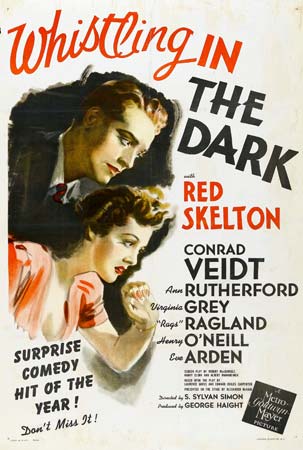
WHISTLING IN THE DARK
US, 1941, 77 minutes, Black and white.
Red Skelton, Conrad Veidt, Ann Rutherford, Virginia Grey, Eve Arden, Rags Ragland, Don Douglas, Lloyd Corrigan.
Directed by S. Sylvia Simon.
Whistling in the Dark is the first of three comedies starring Red Skelton as the radio personality The Fox. The others are Whistling in Dixie and Whistling in Brooklyn. It was Red Skelton's first star vehicle at MGM.
The film was based on a play which was filmed in 1933 with Ernest Truex and Edward Arnold. However, it is a good star vehicle for Skelton who shows his pantomime skills as well as his verbal humour - and some pratfalls and facial comedy for which he was noted. There is a very good supporting cast led by Conrad Veidt as a sinister charlatan with his own religious cult. He has a final line which is used often throughout the film very effectively: `We depart in radiant contentment.' Virginia Grey and Ann Rutherford are the romantic interests and Eve Arden is there for some wisecracking. Rags Ragland is one of the villains (and later was Skelton's assistant in the other films).
The film is reminiscent of some of the Bob Hope vehicles of the period like The Ghostbreakers and The Cat and the Canary. In fact, Skelton in this film is very similar to Bob Hope in presence and style. The film had good MGM production values and is still enjoyable, especially the climax where the hero and the heroines are using a radio to contact a plane and warn a victim against murder.
1.Enjoyable comedy? Thriller? Red Skelton vehicle.
2.The popularity of Red Skelton as a clown, comedian? How well did the film use his talents - and introduce him to movies?
3.MGM production values, black and white photography, smooth polished style? The strong cast?
4.The focus on the cult, Conrad Veidt and his screen career, his screen presence and the suave sinister manner? His conducting ceremonies - and the wealthy women in the cult? His business associates? The prayer, the will and its being contested? The contrast of the businesslike gangster from the religious leader and his slipping from one to the other? The plans against the lawyer? Hearing of The Fox, going to the broadcast, the meeting with Wally? Kidnapping him? Forcing him to make a plan? The sinister behaviour in the house? His leaving, with other members of the cult? Listening to the program and discovering the information being given to the lawyer on the plane? Hastening back to the house, the final confrontation? The contribution of Conrad Veidt to the success of the movie? The satire on religious cults?
5.Red Skelton as Wally, his performance, the contract, love for Carol, entanglement with Fran, Buzz as his manager? The owner? The response to the religious leader, being kidnapped? The spooky house and Wally and the girls going through it? His plan, the poison? The ups and downs of the plan? The betrayal and the testing out of the poison? The comedy of the radio, performing the act in real life, Sylvester and his not knowing it was a trick? The final gymnastics and fights of the finale?
6.Fran as the boss's daughter and her infatuation, in the adventures? Carol and her love for Wally, helping in the adventures? Buzz and her wisecracks?
7.Sylvester, the dumb gangster, participating in the radio performance? Not knowing it was real?
8.The presentation of the criminals - Hollywood comedy style?
9.The world of radio and its popularity at the time? People listening to it on the plane? The little boy, the lawyer - and the comedy about the poison and his teeth?
10.An enjoyable comedy of the '40s? How well does it stand up?